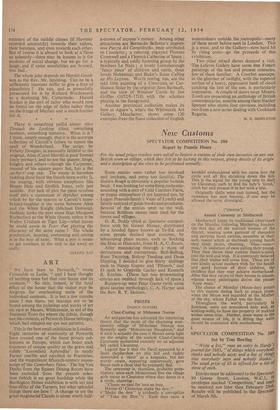SPECTATOR COMPETITION No. 206 Report by Pamela Hoare
For the usual prizes readers were asked to bestow a custom of their own invention on any one British town or village, which they Jelt to be lacking in this respect, giving details of its origin and a description of the rites to be performed annually.
Some entries were rather too involved and intricate, and some too fanciful; The Golden Bough is obviously a popular bedside book. I was looking for something authentic- sounding with a sort of Cold Comfort Farm, or pagan atmosphere (I am haunted too, by Logan Pearsall-Smith's Vicar of Lynch) and faintly satirical of guide books and prochures. Several of the entries went to the wall, because fictitious names were used for the towns and villages.
D. R. Peddy tilted at Spectator competi- tions with his Gower Money, distributed by a hooded figure known as Ye-Ed. and some people devised neat customs, by telescoping place names, such as Socking the Hass at Hassocks, from H. A. C. Evans.
After meandering through a maze of derivations and corruptions, Bull-Belling, Ram Twizzing, Bishop Tussling and Dean Dipping, I decided to give thirty shillings each to Nancy Gunter and `Pibwob,' and El each to Granville Garley and Kenneth S. Kitchin. (These last two prizewinning entries are omitted through lack of space.)
Runners-up were Peter Gayer (with some good taurine mythology), C. A. Harper and the Rev. R. Y. Holmes.
PRIZES
(NANCY GUNTER)
Clout-Casting at Midsomer Norton
An antiquarian has advanced the interesting theory that the name of the charming west- country village of Midsomer Norton was formerly spelt 'Midsummer Naughton,' and if such is actually the case it throws some light on the origins of the ancient Clout-Casting Ceremony performed annually on an adjacent hill called Cloutstop. kerchief embroidered with her name into thd circle and all flee shrieking down the hill. This is the signal for the young Men to dash up Cloutstop, each to find his lady's 'clout,' catch herand present it to her with a kiss.
Originally shifts were cast instead, but the ceremony has now become, if one may be allowed the term, divcstigial.
CPIBWOB
Annual Ceremony at Motherwell
Motherwell keeps its traditional observance on the Monday following Mothering Sunday. On that day all the married women of the district, wearing some garment of sheepskin and carrying hazel catkins, assemble at their well, round which at daybreak joining hands they circle thrice, chanting, `Maa—maa-- maa,' in imitation of ewes calling their young. They then throw their catkins (lamb's-tails)g intothe well and wish. It is commonly believed that their wishes will come true. These are of two kinds; actual mothers wish for the health and good fortune of their children, the childless that they may achieve motherhood. After this they return to their homes in silence, whence some philologists derive the phraSe 'Keep mum.'
The choice of Monday (Moon-day) points to this custom dating back to pagan times, when the Moon was regarded as the Mother of the sky, whose Father was the Sun.


































 Previous page
Previous page